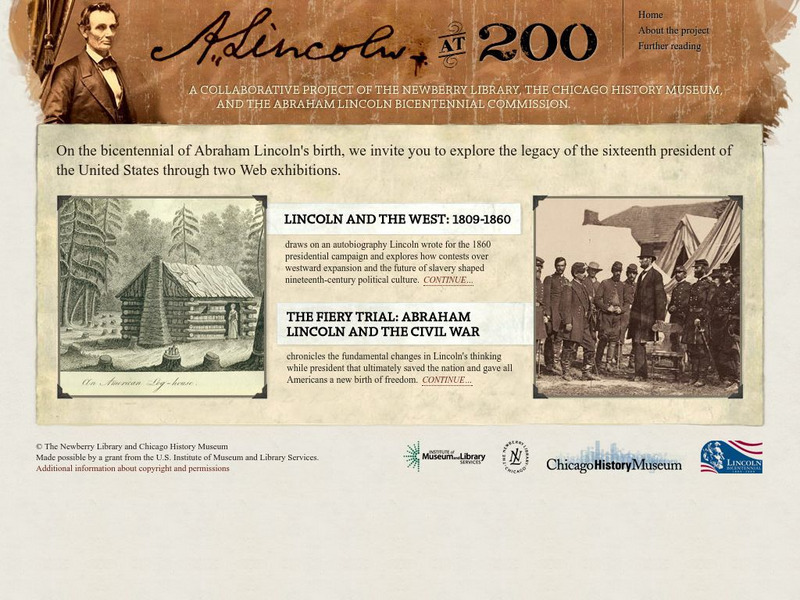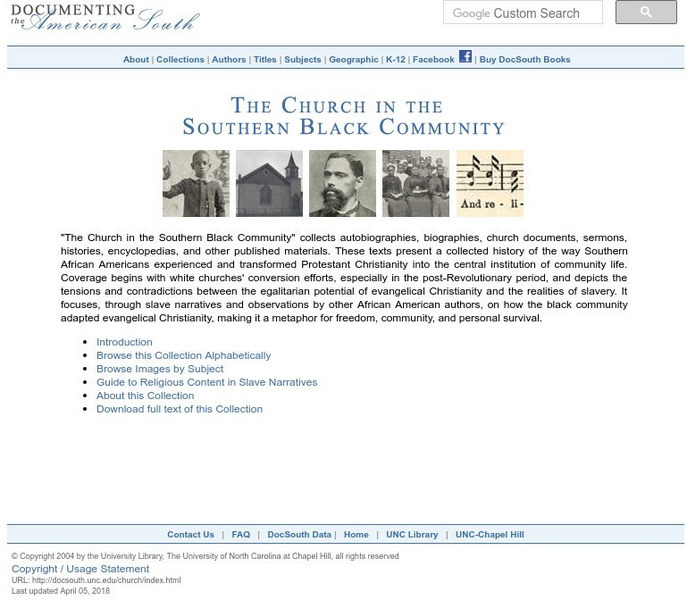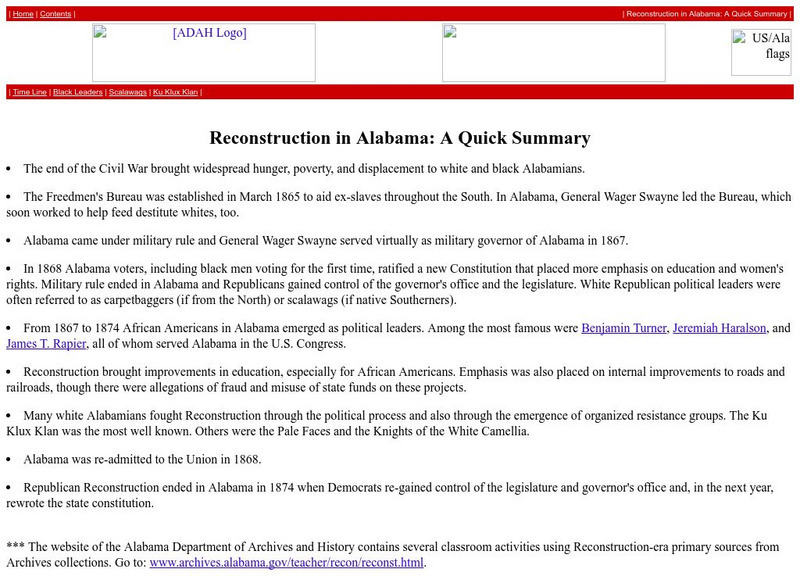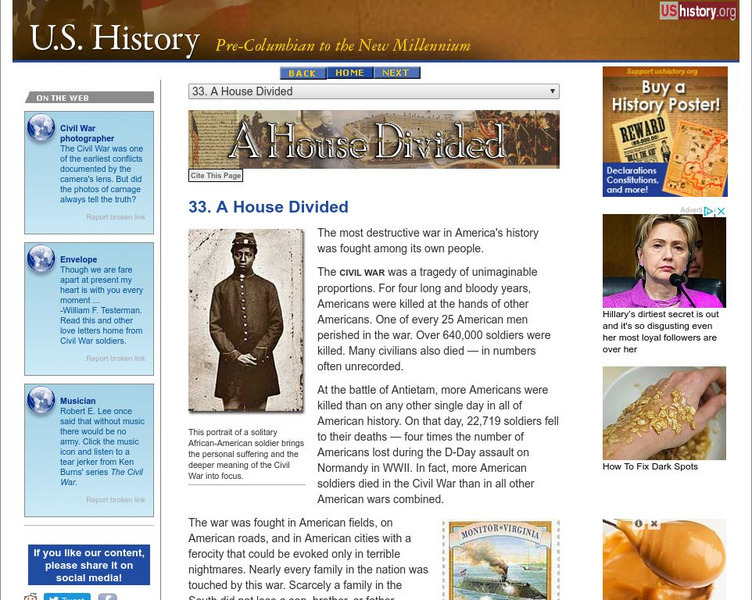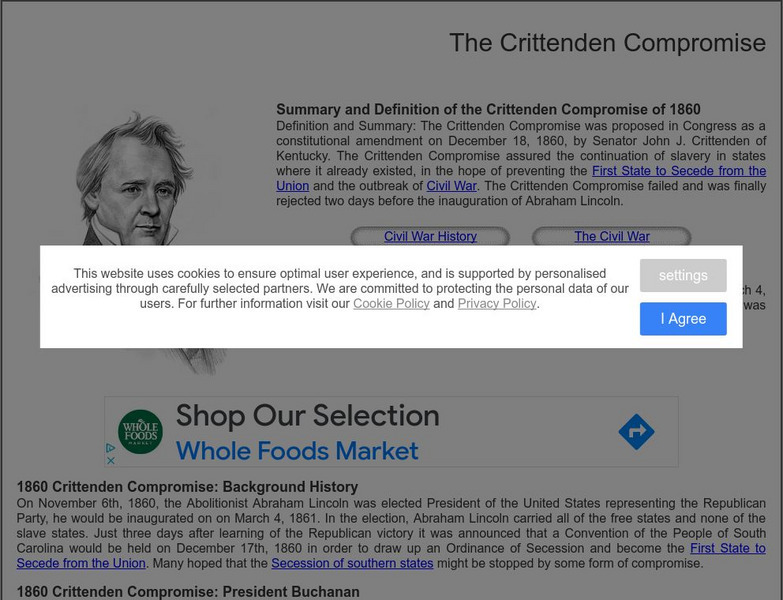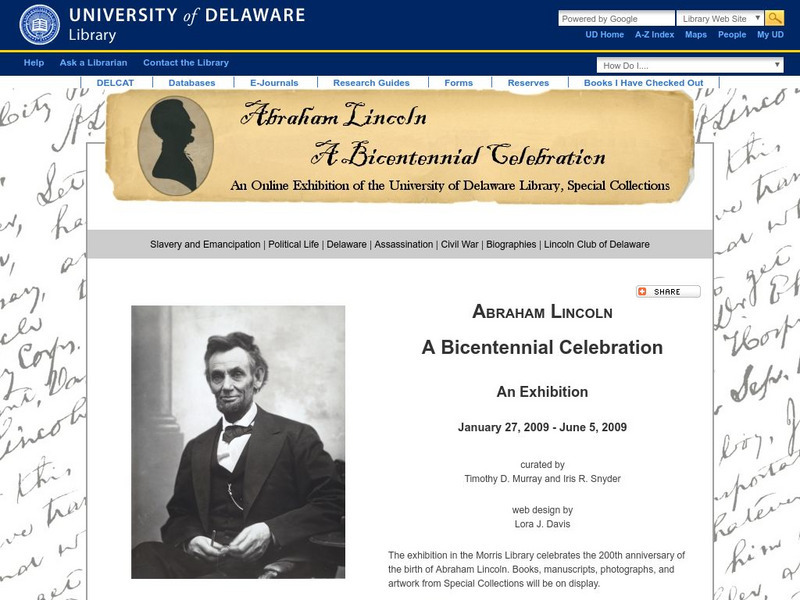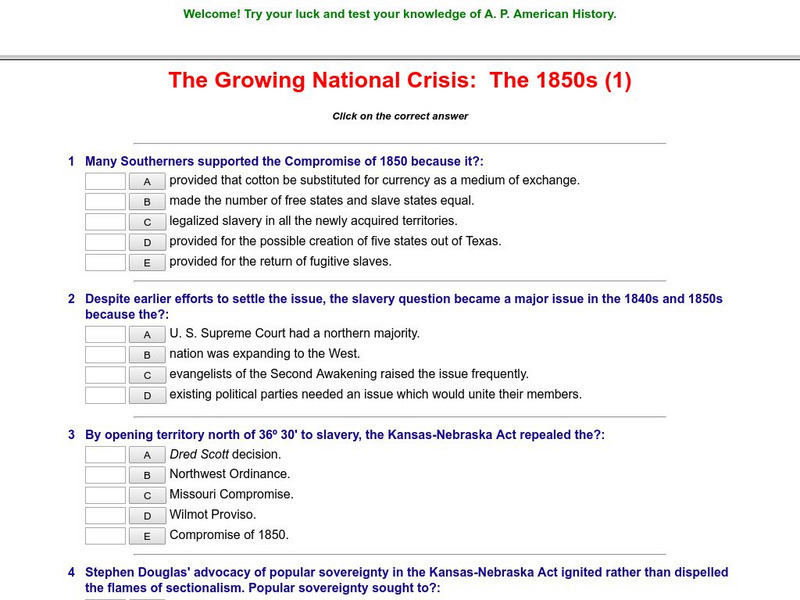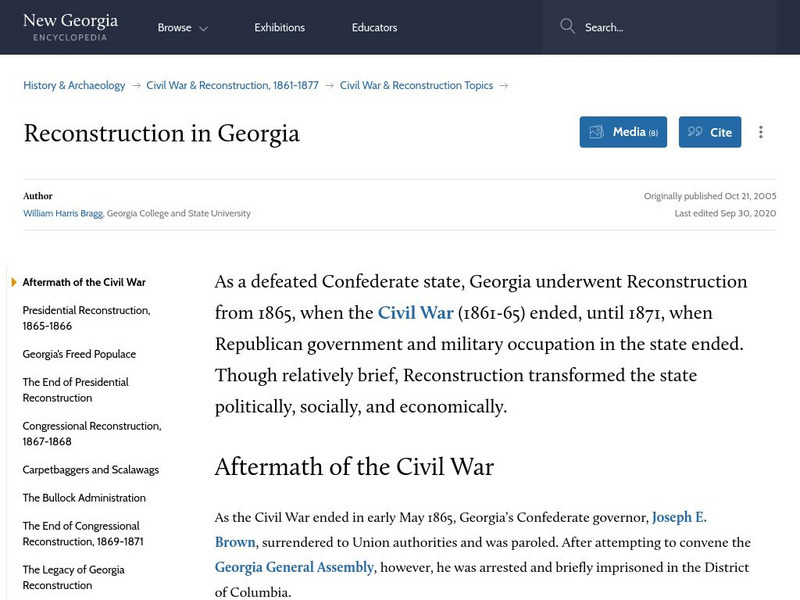Hi, what do you want to do?
PBS
Wnet: Thirteen: Freedom: History of Us: Fatal Contradiction: Missouri Compromise [Pdf]
A lesson plan from the producers of the 16-episode PBS series "Freedom: A History of US" that examines the goal of the Missouri Compromise. A good lesson for comparing and contrasting life in the North and South in the run-up to the...
The Newberry Library
Newberry Library and Chicago History Museum: Lincoln at 200
This is resource provides information which allows users to examine key aspects of Lincoln's life and legacy, such as the circumstances of his birth, his views on slavery, and his assassination.
University of North Carolina
Unc: The Church in the Southern Black Community
These historically significant primary documents trace the evolution of the church in the black south into a significant part of the community.
Other
Alabama.gov: Reconstruction
Learn facts about life in the state of Alabama after the Civil War.
Department of Defense
Do Dea: Ap Us History: Unit 4: A House Divided
This extensive learning module examines how the United States became more connected with the world as it pursued an expansionist foreign policy, became the destination for many new immigrants, and encouraged migration to the Pacific...
McGill University
Mc Gill University: Collection of Lincolniana
Click Enter to find a world of Lincolniana! Start with the Virtual Exhibit that offers collections of manuscripts on Lincoln, the Man, the Civil War, Slavery & Emancipation, Assassination & Death, Trial & Execution of the...
University of Oklahoma
Chronology of u.s. Historical Documents: The Emancipation Proclamation 1864
Here you can find the full text of the Emancipation Proclamation, issued by Abraham Lincoln in September 1862, and passed into law on January 1, 1863.
US National Archives
Nara: The Emancipation Proclamation
The U.S. National Archives and Records Administration (NARA) provides an elaborate overview of Abraham Lincoln's Emancipation Proclamation. Content includes detailed background information behind the document, photos of the original...
Independence Hall Association
U.s. History: A House Divided
A very brief overview of the Civil War, the casualties, and the horrific social and economic effects across the nation. Included is a map that shows when each Southern state seceded from the Uniion.
Columbia University
Columbia University: Columbia University & Slavery Post 1865: Faculty and Admin
After the Civil War concluded in 1865 and the Thirteenth Amendment abolished slavery, Columbia University's faculty members shaped historical interpretations of slavery, the Civil War, and Reconstruction, as well as scientific theories...
Siteseen
Siteseen: Civil Conflict: The Crittenden Compromise of 1860
Web page on the Crittenden Compromise of 1860 which assured the continuation of slavery where it already existed in an attempt to appease Southerners and halt secession of Southern states from the Union.
Columbia University
Columbia University: Columbia University & Slavery 10. Columbia
This website was created by faculty, students, and staff to publicly present information about Columbia's historical connections to the institution of slavery. Like most northern colleges, Columbia admitted no black students before the...
Immigration and Ethnic History Society
Iehs: Katherine S. Carper, "Difficulty of Studying "Immigrants" in Early 19th C"
This article focuses on the study of immigrants in the early 19th century before the Civil War. Migration policy was primarily under state rather than federal control, and as long as slavery existed, there was no national definition of...
Other
Bringing History Home: Segregation History
This 3rd grade unit introduces children to the history of segregation, from the end of the Civil War in 1865 through the 1940s. Its content bridges the period between slavery and the peak of the Civil Rights movement in the 1950s and...
Wikimedia
Wikipedia: Harriet Tubman
This article overviews Harriet Tubman's involvement with the Underground Railroad, her service in the military during the Civil War, and her fight as an activist for African-American and women's rights.
Other
University of Delaware: Abraham Lincoln: A Bicentennial Celebration
Commemorating Abraham Lincoln's 200th birthday, this exhibition provides several documents and photographs remembering the President's life. Resources cover his political career, slavery, the civil war and his assassination.
C3 Teachers
C3 Teachers: u.s. History Module: Did Lincoln Really Want to Free Slaves? [Pdf]
A comprehensive learning module on Abraham Lincoln that includes three supporting questions accompanied by formative tasks and primary source materials, followed by a summative performance task. Students examine the evolution of...
History Teacher
Historyteacher.net: The Growing National Crisis: The 1850s: Quiz (1)
This 12-question multiple choice quiz is immediately scored and covers facts about slavery in the Civil War era.
Digital Public Library of America
Dpla: Secession of the Southern States
This primary source set uses documents, illustrations, and maps to explore events and ideas that drove the formation of the Confederate States of America and the United States' descent into civil war. Includes a teacher's guide.
Columbia University
Columbia University: Columbia University & Slavery 9. John Jay Ii
This website was created by faculty, students, and staff to publicly present information about Columbia's historical connections to the institution of slavery. In the decades before the Civil War, Columbia produced only two graduates who...
Digital History
Digital History: What Was Life Like Under Slavery?
A sobering look at the life of the plantation slave in the decades before the Civil War. Read about the malnutrition, severe treatment, and inadequate living conditions.
PBS
Wnet: Thirteen: A War to End Slavery: John Wilkes Booth and Assassination of Lincoln
A lesson plan from the producers of the 16-episode PBS series "Freedom: A History of US" that examines the factors that led John Wilkes Booth to assassinate President Lincoln. Also involves comparing and contrasting Lincoln's and Andrew...
Georgia Humanities Council and the University of Georgia Press.
New Georgia Encyclopedia: Reconstruction in Georgia
After the Civil War ended, Georgia was in a state of chaos. Learn all about the Reconstruction in Georgia from 1865-1871 and how it changed the state politically, socially, and economically.
Independence Hall Association
U.s. History: The Emancipation Proclamation
The Emancipation Proclamation in 1863 really didn't free a single slave. Read about why that was true, but also find out why Abraham Lincoln felt is was absolutely necessary to make a stand on ending slavery when he did, and how the...





![Wnet: Thirteen: Freedom: History of Us: Fatal Contradiction: Missouri Compromise [Pdf] Lesson Plan Wnet: Thirteen: Freedom: History of Us: Fatal Contradiction: Missouri Compromise [Pdf] Lesson Plan](https://static.lp.lexp.cloud/images/attachment_defaults/resource/large/FPO-knovation.png)
